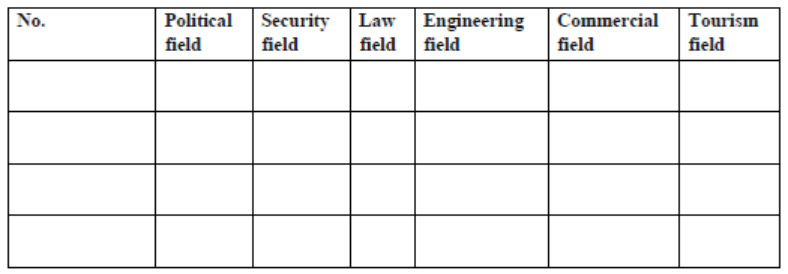UNIT 2: CAREER OPPORTUNITIES
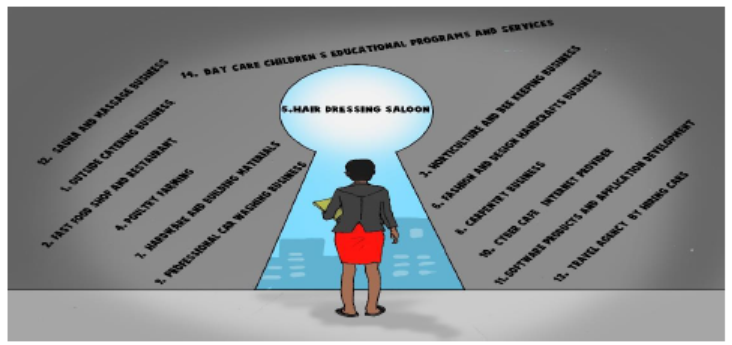
Key unit competence: To be able to make rational career choices and related decisions

1. Identify the type of careers shown in each photograph above.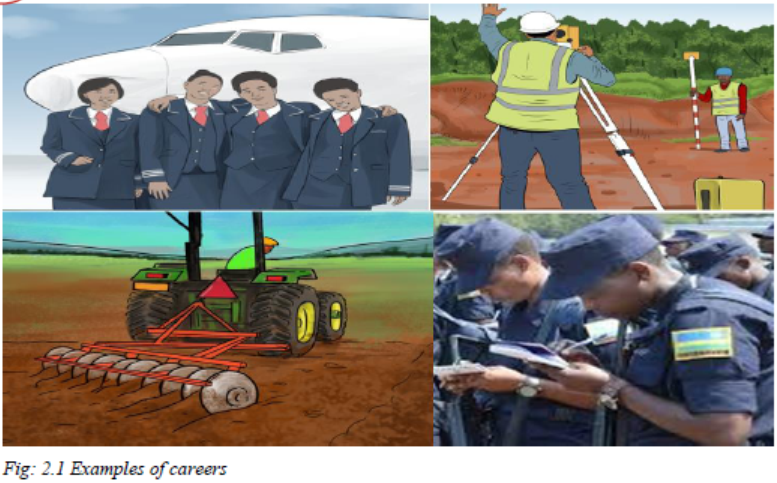
2. Identify the subjects one needs to study so as to pursue each of the above careers.
2.1. Meaning of Career concept, choosing work to do and fields of career opportunities
Activity 2.1
a. What do you understand by the term career?
b. Observe the images below and indicate the jobs related to each career opportunities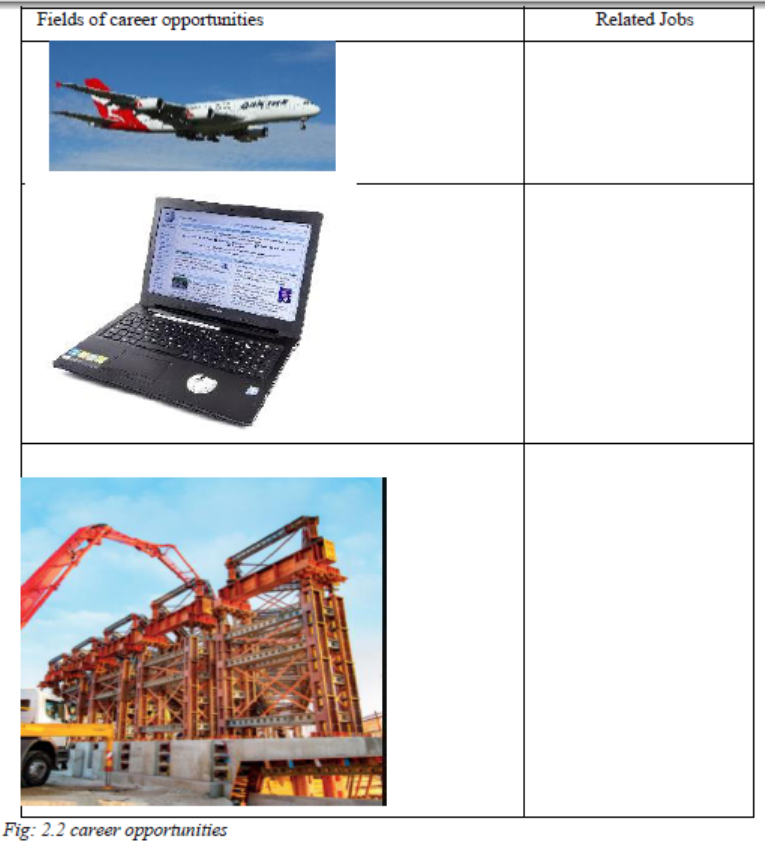
2.1.1. Meaning of career A career is an occupation undertaken for a significant period of a person's life and with opportunities for progress. It can also mean a job or profession that one does for a long period of life for survival which enables him or her to achieve set goals.
It can also be defined as a profession for which one has been trained for as an undertaking or as a permanent calling. It is what one wants to become in the future.
2.1.2. Choosing work to do and fields of career opportunities
Work can be understood as undertaking we get involved in pursuit for our long-life goals. Therefore, it is important to note that, work pre-trained and done for a long time can be referred to as career.
The choice of a career is very important for every person. It requires serious consideration, planning and analysis. Planning your career involves self-evaluation on the following questions, who am I?, what are my interests?, what work environment?, what will I be doing and what are the job trends?. A person can get into many careers.
In each industry or sector of the economy, there are many careers to choose from. Some careers require a lot of physical effort (muscle based) while others require a lot of mental effort (knowledge based). Some other careers require many years of training while others can be joined without formal training.
The following are some of the fields of career opportunities and careers that one can pursue:
There are very many careers in the world. The main fields include:
-Education field for example, head teachers, teachers, school administrators, bursars, and university lecturers.
-Medical field for example, doctors, nurses, surgeons, pharmacists, gynecologists, dermatologists, physicians and so on.

-Agricultural field for example; livestock farmers, dairy farmers, crop growers, etc.

Engineering field for example, biomedical engineers, electrical engineers, civil engineers, telecommunication engineers, mechanical engineers, land surveyors and so on.

-Political field for example, presidents, vice presidents, mayors, ministers, members of parliament (senators), community leaders and so on.

- Commercial and manufacturing field for example, wholesalers, retailers, vehicle manufacturing, textile production, bakeries and confectioneries.

-Transport field for example, freighters, cargo couriers, pilots, air hostesses, drivers, captains and so on.

-Legal field for example, lawyers, judges, juries and attorney generals.

-Finance field for example, bankers, accountants, auditors, money changers, finance consultants and so on.

Security field for example, police, military and army, secret service/intelligence, etc.
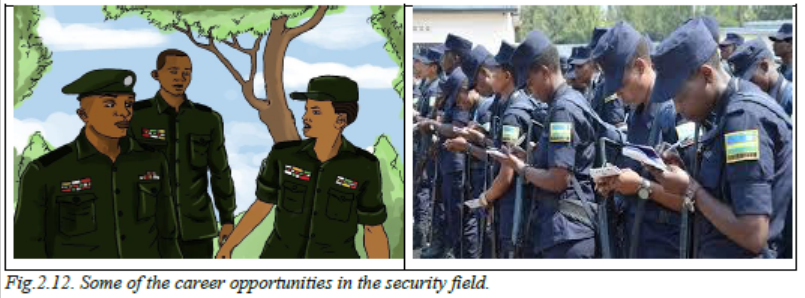
-Media field: This involves people working as news readers, news anchors, and television and radio presenters, journalists and so on.

-Hotel and tourism field for example, waitresses, waiters, chefs, tourist guides, and so on.
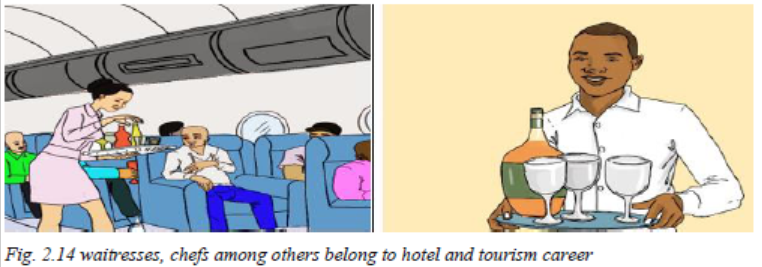
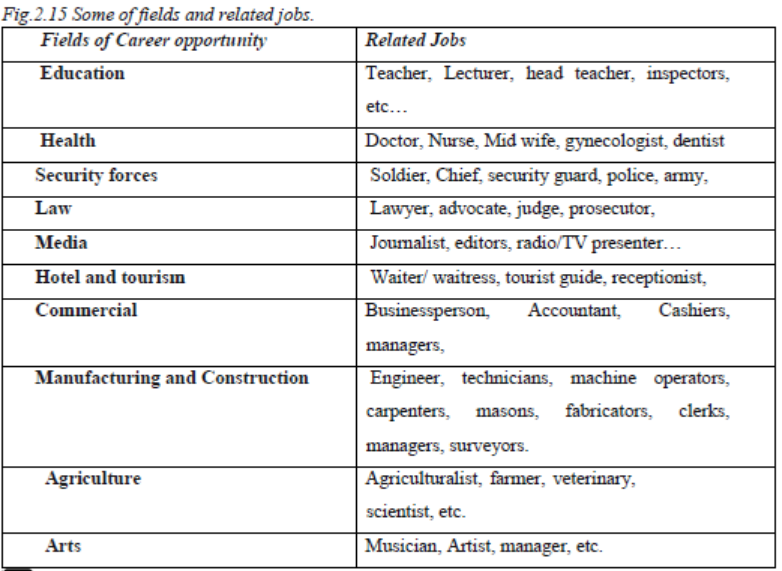
You have acquired very essential and accurate information about what a career is, as well as numerous fields of career opportunities.
Questions:
(a) Reflect on different fields of career opportunities available around your school community
(b)What would you consider while choosing work to do?
2.2. Sources of career information
1 Identify places and people in your home area that can be an inspiration to your career.
2 Use your internet, search on www.gostudy.net to choose a career field by filling in the questionnaire provided.
There are many sources of career information from which an individual may choose from and these sources may include the following:
▪Parents, friends, and relatives: Families and friends can be extremely helpful in providing career information. While they may not always have the information needed, they may know other knowledgeable people and be able to put you in touch with them. These contacts can lead to an “information interview” which usually means talking to someone who can provide information about a career. This person should have the experience to describe how he or she trained for the job, received promotions, and the likes or dislikes of the job. Not only can the person advise what to do but he or she can also advise what not to do.
▪Professional societies, trade groups, and labor unions: These groups have information on careers with which they are associated or which they actively represent. This information may cover training requirements, earnings, and listings of local employers. These groups may train members or potential members themselves or may be able to put you in contact with organizations or individuals who have been in that career for a long time.
▪Personal skills, talent, and passion: The first place to start from when looking for business ideas or opportunities is to look within you. Most people miss this greatest source of career information because of ignorance, laziness, and self-doubt’s. If you are talented or having a proven track record in a specific field, then it is time to analyze that skill or talent. You can discover what you are good at, what career to take by asking yourself the questions such as; what skills or talents do you possess? what are your hobbies? what are you passionate about? do you possess a skill that people are willing to pay for?
Note: It is because of personal skills, talent, and passion that some people popular have the careers they chose.
▪Mass media: This is a wonderful source of information, ideas, and opportunities. Magazines, TV stations, Cable networks, radios, newspapers, and internet sites are all examples of mass media. A careful look at the commercial advertisements in newspapers or magazines, you will discover information on careers, as well as the skills and education level required to join the desired career.
-Guidance and career counsellors:
-Counsellors can help you make choices about which careers might suit you best.
-Counsellors can help you determine what occupations suit your skills by testing your aptitude for various types of work and determining your strengths and interests.
-Counsellors can help you evaluate your options and search for a job in your field or help you select a new field altogether.
-They can also help you determine which educational or training institutions best fit your goals and find ways to finance them. Some counsellors offer other services such as interview coaching, resume building, and help in filling out various forms.
-Counsellors in secondary schools and post-secondary institutions may arrange guest speakers of different career fields, field trips, or job fairs to equip you with detailed information about careers.
▪Libraries: These can be an invaluable source of information since most areas have libraries, they can be a convenient place to look for career information. Also, for those who do not otherwise have access to the Internet or e-mail, many libraries provide this access. Libraries may have information on careers locally and internationally, potential contacts within occupations or industries. Libraries frequently have subscriptions to various trade magazines that can provide information on occupations and industries. These sources often have references to organizations which can provide additional information about training and employment opportunities.
▪Tertiary institutions such as colleges, universities frequently have career centers with libraries of information on different careers, listings of related jobs, and alumni contacts in various professions. Career centers frequently employ career counsellors who generally provide their services only to their learners and alumni. Career centers can help you choose a career, build your resume, find internships and co-operations which can lead to full-time positions, and tailor your course selection or program to make you a more attractive job applicant.
▪Exhibitions, expos, and trade shows: Another means to get career information is to attend exhibitions and trade fairs. These are usually advertised on the radio or in newspapers. By visiting such events regularly, you will not only find out new products and services, but you will as well meet sales representatives, wholesalers, distributors, manufacturers, and franchisers. These are always excellent sources of career information.
▪Listening to customer complaints: Complaints and frustrations on the part of customers have led to prospective career opportunities. Whenever consumers complain badly or bitterly concerning a product or service then, you have the potential for a career opportunity. This will prompt you to acquire more skills as a career opportunity and also to provide better and competitive services or goods.
▪Surveys: You can carry out a survey online or offline. One can visit different people of different career fields and find out the advantages and disadvantages of each career field. This helps you to compare and make an informed decision on which career to undertake.
Note: The above sources aren’t independent but rather complement each other towards choosing an appropriate career. Therefore, in choosing career for example teaching one can use Ministry of education and internet while others can refer to guidance and career counselors.
Application activity 2.2
Assume that you are invited to address your community members after a community service in your home locality. Take this advantage to advise young people in the audience on how to utilize sources of career information available to them to select appropriate careers. What will be entailed in your speech?
2.3. Career guidance and sources of career guidance
a) How can you define the term “career guidance”?
b) Reflecting on your choice of combinations, give reasons why you chose that combination and who helped/influenced you to make your choice
c) Why is career guidance important?
d) Make a list of sources where career guidance can be obtained
2.3.1. Meaning of career guidance
Career guidance is the act of assisting students and adults to successfully choose the right career for themselves, manage and develop it.
2.3.2. Sources of career guidance
Having the right and accurate information is important in the choice of a career. The choice should be based on accurate information. Career guidance can be obtained from various sources:
i. Teachers: Teachers provide best source of career guidance to learners because they spend most of their time with learners hence, they understand their strengths, weaknesses, talents and skills.
ii. Parents: Some families have bias either against or in favor of certain careers and consequently encourage or discourage their family members to either take them up or leave them. Some people, therefore, choose to undertake certain careers because all their family members are taking the same career and are successful.
iii. Career guidance counsellors: These are professionals trained to help people assess their strengths and weaknesses, evaluate their goals and values and determine what they want in a career.
iv. Government officials. Government officials may act as models that can guide us when approached and some have testimonies that can help young people find strength amongst themselves
v. Heroes and mentors. For example, political and humanitarian heroes e.g., Nelson Mandela’s biography is a touching story and an inspiration to many young politicians.
vi. Role models e.g., musicians, athletes are persons looked up to by others as an example to be imitated
vii. Friends and relatives offer advice and support that help to shape and develop career
Application activity 2.3
BAMURANGE, a S3 student at G.S Ntarabana wishes to enroll in associate nursing program. She has been asking her teacher about the program, and the teacher managed to provide her with some information about the program to the best of his knowledge. He also told her about other possible careers.
As a student enrolled in the program,
1. In not more than 4 sentences, guide her on how to join associate nursing program,
2. Evaluate the sources of career guidance which should help Bamurange to make a rational career choice.
3. Advise Bamurange’s teacher on key principles that he should bear in mind while guiding his student.
1.Design a flyer that promotes the Student Business Club to new senior 4 students. The flyer should be attractive and present at least 3 arguments why students should start business projects while they are in school.
1.Read the sentences in the table below and indicate true or false.
a. A journalist belongs to the education field.
b. A DJ belongs to the media field.
c. Teachers belong to the medical field.
d. Police officers belong to the political field.
e. Pilots belong to the airfield.
f. A barrister and chef belong to the same field.
g. Accountants and bankers belong to the finance field.
h. Lawyers and teachers belong to the same field
2. Formulate 5 interview questions you can ask an entrepreneur in your community to find out the advantages and disadvantages of running a business.
3.Give examples of careers one can take in each field by filling in the table below